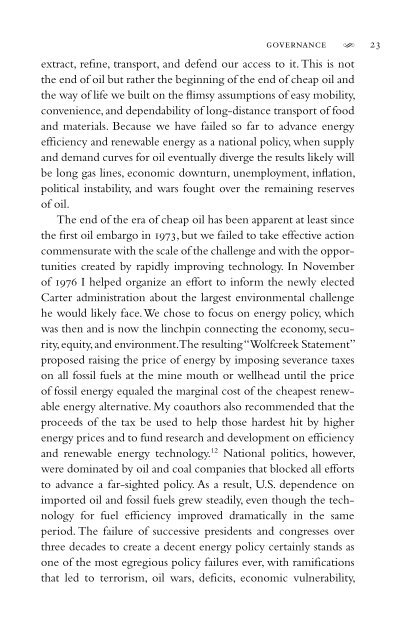Down to the wire : confronting climate collapse / David - Index of
Down to the wire : confronting climate collapse / David - Index of
Down to the wire : confronting climate collapse / David - Index of
Create successful ePaper yourself
Turn your PDF publications into a flip-book with our unique Google optimized e-Paper software.
governance S 23<br />
extract, refi ne, transport, and defend our access <strong>to</strong> it. This is not<br />
<strong>the</strong> end <strong>of</strong> oil but ra<strong>the</strong>r <strong>the</strong> beginning <strong>of</strong> <strong>the</strong> end <strong>of</strong> cheap oil and<br />
<strong>the</strong> way <strong>of</strong> life we built on <strong>the</strong> fl imsy assumptions <strong>of</strong> easy mobility,<br />
convenience, and dependability <strong>of</strong> long-distance transport <strong>of</strong> food<br />
and materials. Because we have failed so far <strong>to</strong> advance energy<br />
effi ciency and renewable energy as a national policy, when supply<br />
and demand curves for oil eventually diverge <strong>the</strong> results likely will<br />
be long gas lines, economic downturn, unemployment, infl ation,<br />
political instability, and wars fought over <strong>the</strong> remaining reserves<br />
<strong>of</strong> oil.<br />
The end <strong>of</strong> <strong>the</strong> era <strong>of</strong> cheap oil has been apparent at least since<br />
<strong>the</strong> fi rst oil embargo in 1973, but we failed <strong>to</strong> take effective action<br />
commensurate with <strong>the</strong> scale <strong>of</strong> <strong>the</strong> challenge and with <strong>the</strong> opportunities<br />
created by rapidly improving technology. In November<br />
<strong>of</strong> 1976 I helped organize an effort <strong>to</strong> inform <strong>the</strong> newly elected<br />
Carter administration about <strong>the</strong> largest environmental challenge<br />
he would likely face. We chose <strong>to</strong> focus on energy policy, which<br />
was <strong>the</strong>n and is now <strong>the</strong> linchpin connecting <strong>the</strong> economy, security,<br />
equity, and environment. The resulting “Wolfcreek Statement”<br />
proposed raising <strong>the</strong> price <strong>of</strong> energy by imposing severance taxes<br />
on all fossil fuels at <strong>the</strong> mine mouth or wellhead until <strong>the</strong> price<br />
<strong>of</strong> fossil energy equaled <strong>the</strong> marginal cost <strong>of</strong> <strong>the</strong> cheapest renewable<br />
energy alternative. My coauthors also recommended that <strong>the</strong><br />
proceeds <strong>of</strong> <strong>the</strong> tax be used <strong>to</strong> help those hardest hit by higher<br />
energy prices and <strong>to</strong> fund research and development on effi ciency<br />
and renewable energy technology. 12 National politics, however,<br />
were dominated by oil and coal companies that blocked all efforts<br />
<strong>to</strong> advance a far-sighted policy. As a result, U.S. dependence on<br />
imported oil and fossil fuels grew steadily, even though <strong>the</strong> technology<br />
for fuel effi ciency improved dramatically in <strong>the</strong> same<br />
period. The failure <strong>of</strong> successive presidents and congresses over<br />
three decades <strong>to</strong> create a decent energy policy certainly stands as<br />
one <strong>of</strong> <strong>the</strong> most egregious policy failures ever, with ramifi cations<br />
that led <strong>to</strong> terrorism, oil wars, defi cits, economic vulnerability,
















